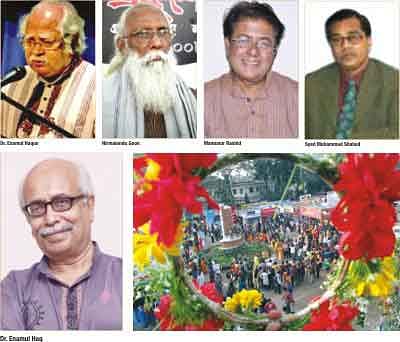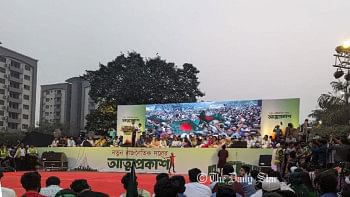Ekush in conscience

Photo: Palash Khan
Dr. Enamul Haque, Historian & Archaeologist
Ekush was deciding factor of our identity. It is the symbol of Bengali nationalism and secularism. Ekush is a constant source of inspiration. Ekush is our harvest of dreams and hopes.
After an arduous struggle, we could officially use our mother language. As a nation, we have always been vigilant about our freedom of expression. Bengalis never tolerate any kind of obstacle in their way.
Through the path of Language Movement, we also attained independence after a brutal nine-month war.
I think that the spirit of Ekush will become stronger day by day.
February 21 played a vital role in making the Bengalis aware of their cultural and national heritage. We have acquired a distinct position in the world for our language.
It is regretful that we notice a barrage of special programmes on Bangla language and literature throughout February, but not nearly enough during the rest of the year. Our language deserves appreciation and respect all around the year.
Nirmalendu Goon, Poet
“Premanghshur Rokto Chai” was first published in 1970, and since then Nirmalendu Goon has grown from strength to strength to become one of the leading poets in the country.
The poet published two new books at this year's Ekushey Book Fair. “Mujibmongol” -- a collection of poems on Bangabandhu Sheikh Mujibur Rahman -- was published by Mizan Publishers, which also published “Cricket Shomogro” -- a book the poet was inspired to write for the love of the game.
Although he used to be a regular at the book fair, Nirmalendu Goon now visits the fair after it's halfway through, and only after 8pm. The poet does this to avoid the crowd. The reclusive Nirmalendu Goon prefers to sit at the Mizan Publishers stall and chat with friends, well-wishers, and sign autographs for fans.
The poet has won the Bangla Academy Award, Ekushey Padak, Jatiya Kobita Parishad Award and countless other recognitions for his contributions to Bangla literature.
However, Nirmalendu Goon did not limit his abilities to the realm of poetry. He also wrote travel books and other literary pieces. He is most famous for his political and romantic poems. Nirmalendu Goon also wrote three autobiographical pieces: “Amar Chhelebela”, “Amar Konthhoshor” and “Atmo-kotha 1971”.
Asked on his view on the 60th anniversary of the Language Movement, Nirmalendu Goon said that people in Assam's Silchar also laid down their lives to uphold rights to speak their mother language. But our Language Movement was recognised as the International Mother Language day -- as it is known better around the world than the Silchar Movement. This is a great achievement, he adds.
Nirmalendu Goon says Ekush taught us never to bow down to adversities, adding that Ekush was a river, which flowed into the Liberation War. There would have been no independence without the Language Movement, Nirmalendu Goon observes, adding that the impact of Ekush cannot be expressed in limited words.
Looking back at olden times, the poet remembers that February 21 was not observed by the masses up till 1962, but the day's significance grew more following the '62 education movement. Nirmalendu Goon says he did not know about the day as a child, but today's children know about its significance.
Nirmalendu Goon hopes that the coming generation will continue to remember and uphold the ideals which the Language Movement represented.
Syed Mohammad Shahed, Former Director General of Bangla Academy
Following the Partition of 1947, we observed that the Pakistan government first attempted to annihilate our identity through imposing Urdu as the only state language. We demanded Bengali alongside Urdu in united Pakistan. The bloodshed of 1952 gave birth to the Bengali conscience that led us to independence.
After independence, Bengali got its proper place in the 1972 constitution. Bangabandhu said that he who does not love Bangla cannot love Bangladesh. Our prime goal was to popularise the use of Bengali everywhere and of course to establish Bengali as a medium of higher studies. It smoothly continued but the assassination of Bangabandhu in 1975 and the subsequent political changeover hampered that trend. Formation of new vocabulary stopped.
We are yet to establish Bengali as a medium in several fields of higher studies including science, medicine and engineering. The tendency of educating children in English medium is on the rise and that was unnecessary. A type of low self-esteem seems to be at work here. Efforts by conscious citizens from all walks of life, technological support and a confident approach can ensure the future place of Bengali in the global reality.
Dr. Enamul Haq, Theatre Personality
Veteran actor-director of Nagarik Natyangan, Dr. Enamul Haq is among those who received this year's Ekushey Padak (award) in the field of arts and culture. Haq wrote “Mala Ekshoto Malancha”, the first TV play on the Language Movement, aired on Bangladesh Television in 1972. The late Syed Siddique Hossain was the producer of the play.
Ekushey Padak brings immense joy to Haq, as he conveys. He considers it an award that signifies “recognition of sacrifice” as well as the spirit of “struggle against odds”.
“To me, this award is recognition of my works over the years,” says Haq.
On the 60th anniversary of Language Movement, Haq shares that keeping intact of the authenticity of Bangla language is a matter of concern now. He feels that abuse of the language is apparent in media and in other sectors.
“We must think seriously about this issue. We can initiate a common language or a common way of talking for everyone. There are regional dialects in the country. Those dialects can be developed but we must follow a particular way of talking in public spheres,” says Haq.
Mamunur Rashid, Theatre Personality
Veteran theatre personality and chief secretary of Aranyak Natyadal, Mamunur Rashid, received this year's Ekushey Padak for his contribution to the field of arts and culture. He is delighted to receive this national award; however, he shares that if the authority had particularly chosen him for his contribution to theatre, it would have been more meaningful.
“Anyone would be elated to receive such a prestigious award. It brings immense pleasure to me as well,” says Rashid.
The country is observing 60th anniversary of the Language Movement this year. On this special occasion, Rashid pays tribute to the heroes and talks about some promises that are yet to be fulfilled.
“The aim of Language Movement was to establish Bangla as the main language in every sector. After 60 years, the government still has to work on this issue. Nowadays, middle and upper middle class people prefer sending their children to the English medium schools so that they can learn English comprehensively. It does not go with the spirit of the movement.
“To me, learning other languages is only important after knowing the mother tongue thoroughly,” says Rashid.
Rashid also says that the government must make sure that people belonging to different ethnic communities can use their respective mother languages frequently in every sector.
Rashid, who has directed numerous successful stage plays for his troupe, says that awards such as Ekushey Padak should never be politicised.

 For all latest news, follow The Daily Star's Google News channel.
For all latest news, follow The Daily Star's Google News channel. 



Comments